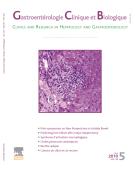L'infection par H. pylori ou son éradication jouent-elles un rôle dans le reflux gastro-oesophagien ? - 29/02/08
Frank ZERBIB
Mostrare le affiliazioniLes relations entre l'infection par Helicobacter pylori ( H. pylori ) et le reflux gastro-oesophagien (RGO) sont controversées. L'infection par H. pylori n'est pas plus fréquente au cours du RGO, sa prévalence semblant même diminuée dans certaines études, ce qui suggère que la bactérie pourrait jouer un rôle protecteur, empêchant le développement de symptômes ou d'une oesophagite. Cette hypothèse a été confortée par la constatation d'une incidence accrue d'oesophagites après éradication de la bactérie chez des ulcéreux, bien que des résultats contradictoires aient été rapportés. Cette observation pourrait s'expliquer par la restauration d'une sécrétion acide gastrique normale après éradication de la bactérie chez les malades qui avaient une gastrite fundique. Plusieurs études ont montré que l'éradication de H. pylori chez les malades ayant un RGO n'aggravait pas les symptômes, voire pourrait les améliorer. En revanche, l'infection par H. pylori est susceptible d'interférer avec le traitement médical, car elle augmente l'efficacité des traitements anti-sécrétoires, le pH gastrique sous traitement ayant tendance à diminuer après l'éradication ; toutefois, les conséquences en termes de soulagement symptomatique et/ou de cicatrisation sont probablement négligeables. Enfin, les inhibiteurs de la pompe à protons, prescrits au long cours pour un RGO, pourraient, surtout en cas d'infection par H. pylori , favoriser le développement de l'atrophie gastrique, facteur de risque d'adénocarcinome gastrique. Des résultats contradictoires ont été rapportés et l'éradication de l'infection avant d'entreprendre un traitement anti-sécrétoire au long cours ne peut actuellement être recommandée de façon systématique, des travaux supplémentaires étant nécessaires pour en évaluer le bien-fondé.
Does H. pylori infection or its eradication play a role in gastroeosphageal reflux disease? |
The relationships between Helicobacter pylori ( H. pylori )and gastroesophageal reflux disease (GERD) remain controversial. Epidemiological studies do not support an important role of H. pylori in the pathogenesis of GERD although some studies showing a low prevalence of the infection in GERD patients suggest that it could protect against the development of either symptoms or esophagitis. This hypothesis has been reinforced by the increased prevalence of esophagitis following H. pylori eradication in duodenal ulcer patients, although conflicting results have been reported. An increased gastric acid secretion following H. pylori eradication in patients who previously had corpus gastritis may explain this phenomenon. H. pylori eradication does not exacerbate GERD symptoms and may, in some cases, improve them. H. pylori -associated gastritis enhances the efficacy of antisecretory drugs as evidenced by the lower gastric pH values after eradication; however, as far as healing rates and symptom relief are concerned, the differences are probably not clinically relevant. Long term treatment with proton pump inhibitors could accelerate the development of atrophic gastritis, and therefore increase the risk of gastric cancer. However, conflicting results have been reported, so that further studies are needed before considering eradication of H. pylori systematically before long-term medical treatment for GERD.
Mappa
© 2003 Elsevier Masson SAS. Tous droits réservés.
Vol 27 - N° 3-C2
P. 427-431 - Marzo 2003 Ritorno al numeroBenvenuto su EM|consulte, il riferimento dei professionisti della salute.

